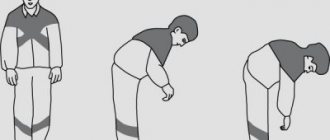“You did great, you did everything just wonderful!” It would be nice to hear only such words. But in reality, rarely does a day go by without criticism. They make comments to us at work, at home, in transport, and anywhere. Since criticism cannot be avoided, you need to learn how to respond to it correctly. In this article we will look in detail at how to respond to criticism addressed to you.
Why do criticism hurt us?
Criticism makes us feel that our efforts are not appreciated, and that we ourselves are considered worse than we are. This causes negative emotions - anger, resentment. This reaction is inherent in nature.
But you shouldn't give in to emotions. We all know stories when one remark leads to a fight, family scandal or dismissal from work. In order to avoid getting into unpleasant situations, you need to know how to properly respond to criticism addressed to you. Moreover, criticism can be very useful. It can point out objective shortcomings and help prevent these mistakes in the future.
Most of all, criticism hurts perfectionists and people who are not very confident.
- Perfectionists strive to be perfect and do everything A+ the first time. But this doesn’t happen in life, and you need to try to take it for granted. Absolutely everyone makes mistakes, there’s nothing wrong with that. Moreover, shortcomings noticed by someone are a unique opportunity for development. After all, next time you will take into account the comments and will not allow them.
- People who are not very confident in themselves may take comments negatively personally. On the one hand, low self-esteem stimulates them to move forward and develop. But worries due to criticism take a lot of mental strength and can hinder development. Therefore, it is important to know how to react correctly to criticism so that it is only beneficial and does not unsettle you.
The critic's motives
It can be helpful to think about the motives of the person criticizing you.
If you didn’t ask for feedback, then most likely the critic is trying to “do well” not for you, but for himself. In the simplest case, it increases self-esteem at your expense. It is also possible that he is experiencing discomfort and cannot do anything about it except criticize you (“It’s your fault that I want to eat.” I.A. Krylov, “The Wolf and the Lamb”).
Understanding the critic's motives greatly helps to correctly relate to his statements. If you see that a person simply wants to belittle you, then there is no point in wondering whether his reproaches are fair, whether you need to apologize or improve. Answer in one of the two ways listed above - and forget about it.
Types of criticism
Criticism can be fair, partly fair and unfair. Let's look at the different types and then look at how to adequately respond to criticism at work, at home and anywhere.
| Type of criticism | Example | Signs |
| Fair | There were typos in the text about interior design, be careful. (There were indeed typos). | The criticism is justified - there were typos in the text. |
| Partially fair | There are always a lot of typos in your texts. (There were typos in one text, but not in others). | The criticism is partly justified - there were indeed typos in one text. But the generalization “there are always a lot of typos” is not justified. |
| Unfair | There are always a lot of typos in your texts. (There were no typos). | There were no typos - the criticism was not justified. |
How to understand whether criticism is fair or not?
- Delve into the essence of the critical remark; it is not always clear right away, especially when it comes to emotions. Ask clarifying questions if you cannot understand what exactly the problem is. Separate the other person's emotions from the facts. Just put aside your emotions. Focus on the facts.
- Find out if the criticism is justified. Perhaps the person looked at your work diagonally, made the wrong conclusions, misunderstood something, or simply didn’t see it. Ask additional questions, ask the interlocutor to specify the problem. For example, indicate exactly where he noticed the error.
- If the answer to the validity of the criticism is ambiguous, gather more opinions. The majority opinion will help you understand how objective the critic is in his assessment.
- Ask yourself why the person is criticizing you, what is his goal. If this is your friend or loved one, he probably really wants to help. If this is a colleague with whom you constantly compete, he may be disingenuous.
- Generalizations (“you are a bad worker”, “you don’t understand anything”), getting personal (criticism not of a specific action, but of your personality) are always unfair.
Benefit from criticism
After all these stages, it is worth thinking about how constructive the criticism is.
It is quite possible that the comments that were made to you are sensible, at least partially. Especially if you yourself asked for feedback. Think about how you can benefit from them, what you can learn, what you should pay attention to. Thank the critic quite sincerely, because you learned something useful for yourself.
Healthy? Share the article on VKontakte or Facebook in 1 click!
How to respond to fair criticism?
Fair criticism is of great value. It is she who helps you grow as a professional and as a person. To benefit from criticism, follow these tips:
- Agree with the criticism. Speak calmly and kindly, without unnecessary apologies and self-accusations, but also without arrogance.
- Do not give in to emotions, even if your interlocutor is seething. Carefully steer the conversation in a constructive direction. Ask questions, offer a solution to the problem.
Example 1.
Client: you didn’t understand the topic at all when you wrote the text!
You: please clarify what factual errors are in the text? I relied on product reviews that are available in open sources. They may not reflect all the important features of the product.
Client: Product A is not compatible with Product B!
You: I understand, I will correct this information. Are there any other factual errors in the text?
Client: apparently not, but about compatibility needs to be fixed!!!
You: yes, I’ll correct the text within an hour and send it to you.
Explanation: The client noticed an error that really upset him. Perhaps the client's reaction is not entirely adequate. But there really is a mistake. It needs to be fixed.
Example 2.
Client: you missed all the deadlines. How is this possible, I was waiting for work earlier!
You: yes, I sent the first part of the layouts a day later. But this will not affect the deadline for all layouts; they will be ready by September 20. You can break the work into smaller steps. For example, I will send the next 5 layouts by the 10th.
Client: yes, send by the 10th!
Explanation: you missed the deadline, this is really a problem. Since it is clear from the conversation that the client is very scrupulous about the timing of the project, offer to deliver the work in stages to make him feel more relaxed.
External manifestations of fear of criticism
If the fear of criticism has already formed, it will manifest itself in behavior and character traits:
- Lack of initiative . The fear that you may be judged or criticized causes passivity in any matter, even a very interesting one. Therefore, you put off searching for new customers or refuse to complete test tasks.
- Shyness . Outwardly, it manifests itself in constrained movements, silence, and avoidance of eye contact. Shy people find it very difficult to leave their comfort zone, communicate with strangers, and find a way out of unusual situations.
- Failure to express your opinion results in you agreeing with everything others say. A person is afraid to say something wrong and cause condemnation from others.
- Inability to say “no” . Due to the fear of criticism, a person with weak boundaries allows others to manipulate him and agree to what he absolutely does not like.
- Constant feeling of guilt . Guilt before yourself for not doing what you want, not developing, not respecting yourself. And blaming others for not being able to do better, creating a lot of problems and causing negative emotions. And this is not the entire list.
Yes, you may feel anxious when you show your work to other people, you may think about the criticism leveled at you. But, if the fear of criticism prevents you from growing and developing, doing your job well, causing you constant negative emotions or even panic, it’s time to do something about it.
How to respond to unfair criticism?
Here, a lot depends on who exactly is criticizing you and how important your relationship with this person is.
Let's consider different options:
- Switch your interlocutor from emotions to facts. Ask what exactly you don’t like. Ask alternative questions.
- Calmly “return” criticism. For example, say: “I don’t think your comment is fair.”
- “Rephrase” criticism in a constructive way. For example, if they tell you: “You always miss deadlines!”, answer: “Yes, I submitted this work a day after the deadline.”
- Draw the interlocutor's attention to the weak points in the criticism, its illogicality and groundlessness.
- React with humor. “Yes, I am like that, I’m surprised how the earth still carries me!” This is a great option on how to stop reacting to unfair criticism.
- Let it fall on deaf ears. Especially if these are the words of a random passerby or driver in a nearby car.
How to ignore unfair criticism?
It happens that someone constantly picks on you for no reason. In this case, a possible response option is ignoring. For example, use the “aquarium” psychological technique. Imagine that you are behind glass, and the offensive words of your opponent do not reach you. Without listening, nod, assent, and at the same time continue to do it your way. This option is more suitable for everyday situations.
But there is a bolder and more effective technique. Ask directly - “Why do you constantly make comments to me?” If the purpose of criticizing a person is manipulation (he wants to make you feel guilty, incompetent) - with such a question you will reveal the manipulation, and in the future it will become impossible.
Example 1.
Client: the text needs to be rewritten, it’s terrible! Have you even read it yourself?
You: please clarify what exactly you don’t like in the text?
Client: I’m not happy with everything!
You: please look at the title of the text, do you have any suggestions regarding it?
Client: no!
You: first paragraph of text? Does anything need to be fixed in it?
Client: no, don't!
You: let's look at the second paragraph to see if anything needs to be edited here.
Client: okay, leave it like that already.
Explanation: the client did not like something, but he cannot say what exactly. Or he's just in a bad mood. Or he didn't want to pay for the work. Be that as it may, the client cannot formulate the reason for the dissatisfaction, which means that the criticism can hardly be called fair.
Example 2.
Client: fellow programmer, you are doing a sloppy job!
You: please clarify what you weren’t happy with at work? All functions specified in the technical specifications are ready and working correctly.
Client: where is the commenting on the site? There is no such function at all!
You: adding a commenting function was not in the technical specifications. If it is necessary, it can be implemented, the cost will be about X rubles, it will take approximately a week.
Explanation: the client simply did not fully understand your work. This happens often. It is necessary to explain (or remind) what is included in the service and what is not.
Why do people criticize?
Some do this all the time out of habit, others are professional critics. Yes, there are some. This is an independent profession. There are, for example, literary critics, film critics, people who professionally evaluate music, the qualities of people (public relations specialists who create an image for public figures).
Often, the judgments of professionals about the analyzed, evaluated objects and subjects are fair and objective. The point is that fairness and objectivity are literally job descriptions in these examples. Such people do not pursue personal interests, they are not consumed by envy or emotions. They have a purpose. And it is strictly professional in nature.
There are also people for whom criticism is something like a habit. They deliberately look for negative qualities in something or someone in order to show others their “sharp” mind and even superiority. They don't know good intentions. Critics are closer to causticism; they need moral nourishment from the very fact that someone or something is worse than is commonly believed. Unfair judgments are all such people live by. They can be objective, but they do not know how to present themselves and their opinions. Instead of solving the problem or correcting the mistakes made in a fit of desire to condemn everything and everyone, they will stand their ground.
There is a special class of people who consider themselves professional critics, but put forward subjective judgments that are not adequate to reality. A striking example of this is amateur reviews under the auspices of “professionalism” online or in real life about movies, music, and other people (comments under photos on social networks or direct statements). These people are far from professionals, but at the same time they are not driven by such motives as envy, anger or the desire to belittle something or someone. They do not seek to cause moral or material harm; they are driven by the thought of their own “professionalism.”
Thus, in the context of the topic, a professional critic is a person who does serious work and gives objective assessments.
An amateur is a person dependent on judgments about others; he cannot live without it. The fact of searching and finding flaws in objects, things, phenomena, and people is important to him. He enjoys it.
The last type of people indicated are subjective individuals, their judgments have nothing to do with reality. They consider themselves professionals and think that they should teach others. However, unlike amateurs, it should be noted that such people do not “feed” on malice or anger.
Who do you consider yourself to be: a professional, an amateur or a subjective critic?
I criticize people, objects, and phenomena exclusively objectively. I'm professional.
50%
I love to criticize people and things around me, I enjoy it.
16.67%
To be honest, I constantly criticize everything and everyone, on and off topic, but I do it subjectively.
33.33%
Voted: 6
How to work with edits
You have to make adjustments to your work almost constantly, even if you are a professional with extensive experience. Each customer is unique and has his own vision of the result. Therefore, edits should not always be taken as criticism. But you need to work with them correctly so that it does not turn into endless reworking of the work, and your relationship with the client remains the most friendly.
- Discuss all the nuances regarding edits before the start of cooperation . The client may feel that he has the right to ask for the work to be edited ad infinitum. Therefore, at the stage of discussing the terms of cooperation, explain how you work with edits: how many days after the delivery of the project are you ready to accept requests for making corrections, how many rounds of edits are you ready to make and how much will it cost to make edits after this period has expired, etc.
- Coordinate each stage of the project . If the work is large-scale, then making changes at the very end will be quite difficult. Therefore, it is better to do this after each stage of the project. This way you won’t get lost in the numerous demands of the customer, and you can avoid dissatisfaction at the end of the whole job.
- Don't waste time on unnecessary arguments and listen to the client . If the customer wants to see the project one way and no other way, so be it. Even if you don't like his ideas. Just fix it. However, sometimes the customer finds fault with every little thing or asks to correct something, then return it to its original form, then correct it again. For an additional fee - please. Otherwise, do not allow yourself to be pushed around and “slow down” the client in time.
- Plan time for revision . It’s not the customer’s fault that you haven’t made changes to his work yet, but you already have ten new clients and don’t have time. If the customer accepts the job the first time, rejoice, you are lucky. But be prepared for the fact that you will have to allocate 2-3 days to finalize the current project.
And remember that criticism has always existed and will exist. Therefore, it is completely impossible to avoid it. But you can learn to perceive it correctly, overcome the fear within yourself and get rid of the painful perception of criticism.
Constructive criticism helps us look at ourselves from the outside, correct mistakes that we ourselves do not notice, and draw useful conclusions. The same applies to making edits. They are an integral part of being a freelancer and allow you to not only change your work, but improve it.
Therefore, use tips and techniques to combat the fear of criticism, try to be objective about all critical remarks.
And feel free to get to work!
How to behave if you are criticized?
Criticism, even the most constructive one, always evokes emotions, so when someone criticizes you, you must first listen to yourself. Determine whether the criticism caused you emotions, and if so, how strong. If your emotions are very strong, then you need to reduce your anxiety level and calm down a little: take a breath of fresh air, drink a glass of water, wash your face with cold water. Only after the strong emotional reaction has passed can you respond to criticism. You can tell your opponent that the criticism is not constructive and that it makes you feel bad. Or, if the criticism is constructive, break down what the other person said to you and turn the criticism into feedback.
Ekaterina Sigitova
The previous manual “How to Criticize Correctly” very clearly highlighted the problem, the appearance of which, of course, was to be expected. A huge number of people cannot, simply are not able to adequately respond to even the most constructive and friendly criticism. Why? Yes, because it hurts them a lot every time. That is, the manual, of course, made their life a little easier, because it became clear that it makes sense to flush some criticism down the toilet instead of wasting your nerves on it. But what to do with correct criticism? Especially if she is important to you. What to do if you need feedback, but even careful and gentle comments make you cringe worse than sciatica, and you completely lose motivation and generally the will to live?
I decided to write a second manual. About how to take criticism if you have big problems with it. It should certainly be useful to no fewer people than the first











